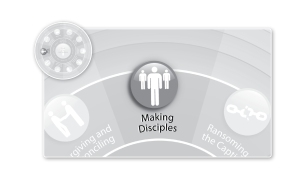Part V of our series on Making Disciples
 “Did you teach them how to receive all the grace that I poured into you?”
“Did you teach them how to receive all the grace that I poured into you?”
That, as we learned in our last post, is the question each teacher will have to answer on the last day. And one of the most fitting applications is prayer. It goes without saying that we ought to be discipling less mature Christians in prayer, pouring our experience out into them.
But, surprisingly, prayer is an area that receives comparatively little instructional attention at an individual level.
Arthur Paul Boers is pastoral theology professor at Associated Mennonite Biblical Seminary, and he points out in a well-crafted Christianity Today article that our individualism these days makes us reluctant to use the method Jesus used to train people how to pray:
Imitation.
We think if you don’t come up with all your own words it’s somehow insincere. What a weird modern idea! Of course you learn how to pray by imitating other Christians! And that’s why Christians need to pray together, out loud, with more mature Christians guiding the process. Sadly, that’s just not the way we pray today. Here’s what Boers writes:
Too often, people who pray do so only briefly, without discipline or organization. They pray “on the fly,” winging phrases toward God while commuting, or squeezing in an occasional devotional. Such prayers are ad hoc and self-directed: made up along the way, according to mood, and not paying attention to the Christian year.
Rather than having help, support, or direction from others with maturity or experience, many Christians decide on their own what to do. As a result, they find themselves increasingly disconnected and isolated from other believers. They are subjective; guided by their feelings of the moment, they freely abandon prayer modes (confession, praise, intercession). In the end, these Christians find themselves increasingly disconnected from God.
The question is not whether Christians ought to pray written prayers or spontaneous ones. Rather, it’s:
How can Christians be discipled to grow in the Work of Piety of prayer?
Written prayers are one possible tool, but they can just as equally inhibit growth if we read them without learning how to imitate them in our own prayers.
Guidance on how to do that is key. In our next post, we’ll see a real-life example of what it looks like to guide someone through the process of imitation in prayer. Don’t miss it.
What about you? How did you learn to pray? What authors, books, pastors, or verses played a key role in your own prayer life?











My paternal grandmother lived with our family during my growing up years. She spent a great deal of time in her bedroom where she could be heard praying to her (our) Lord. I must confess that I still do not emulate her often enough, but I know the routine. She also prayed frequently for me and my sister while sitting on her lap; Perhaps this is the catalyst I need.
I agree, Fred–there’s no better impetus to pray than a real live example whom we see day after day, often a relative. My mother-in-law is that for me.